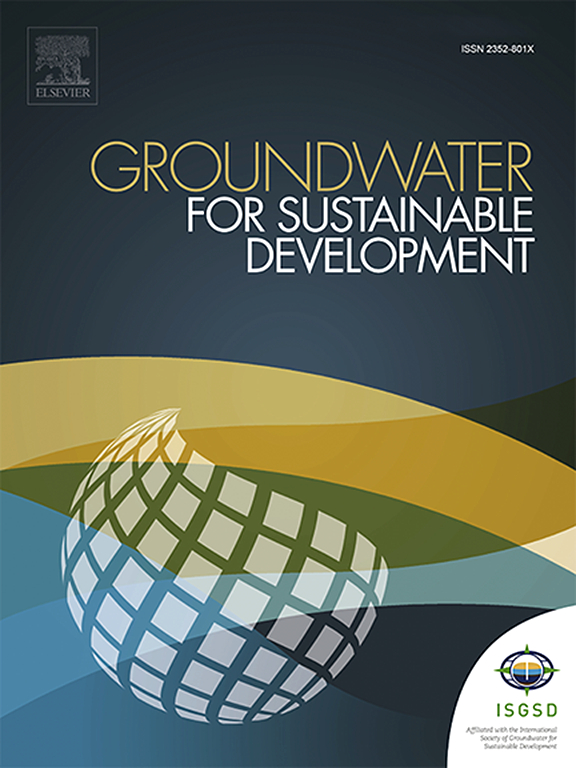Strategies for water salinity management in alluvial aquifer in a multilevel crop planning
IF 4.9
Q2 ENGINEERING, ENVIRONMENTAL
引用次数: 0
Abstract
This article analyses the behaviour of groundwater salinity and its suitability for irrigation purposes and proposes multilevel crop planning to increase agricultural benefits based on water salinity management strategies. The study area is a 12-km-long portion of an alluvial aquifer, where the irrigated perimeter of Sumé is located, in the municipality of Sumé, in the State of Paraíba, Brazil. Three wells were selected, located in the middle portion and at the ends of the aquifer. Based on the physical-chemical data collected, the classification of groundwater for agricultural use was carried out. Then, a multilevel planning model based on water salinity management is proposed, considering the geographic scale of the aquifer, different decision-making levels (lot and of irrigated perimeter), in addition to the involvement of different actors, including organizations and small farmers, at different decision levels. The results indicated that the waters in the initial portion of the aquifer have the highest levels of salinity and that the waters in the final reach have better quality, possibly due to the shorter and longer distances from the sources of contamination, respectively. The possibility of increasing the availability of water in the aquifer and the crop yield was indicated, in addition to other benefits related to the qualification of farmers and the commercialization of products, among others. In this sense, multilevel planning is suggested as a tool that can generate benefits for farmers beyond crop yields, including social and economic aspects.

多层作物规划中冲积含水层水盐度管理策略
本文分析了地下水盐度的变化规律及其对灌溉目的的适宜性,提出了基于水盐度管理策略的多层次作物规划以提高农业效益。研究区域是巴西Paraíba州sum市的冲积含水层的一个12公里长的部分,这里是sum的灌溉边界。选择了3口井,分别位于含水层的中部和末端。根据收集到的物化数据,对地下水进行了农业利用分类。然后,考虑含水层的地理尺度、不同的决策层面(地块和灌溉周长)以及不同决策层面的不同行为者(包括组织和小农)的参与,提出了基于水盐度管理的多层次规划模型。结果表明,含水层起始段的水含盐量最高,最终段的水质量较好,这可能是由于距离污染源较近和较远。除了与农民资格和产品商业化等有关的其他利益外,还指出了增加含水层中水的供应和作物产量的可能性。从这个意义上说,多层规划被认为是一种工具,可以为农民带来作物产量以外的利益,包括社会和经济方面的利益。
本文章由计算机程序翻译,如有差异,请以英文原文为准。
求助全文
约1分钟内获得全文
求助全文
来源期刊

Groundwater for Sustainable Development
Social Sciences-Geography, Planning and Development
CiteScore
11.50
自引率
10.20%
发文量
152
期刊介绍:
Groundwater for Sustainable Development is directed to different stakeholders and professionals, including government and non-governmental organizations, international funding agencies, universities, public water institutions, public health and other public/private sector professionals, and other relevant institutions. It is aimed at professionals, academics and students in the fields of disciplines such as: groundwater and its connection to surface hydrology and environment, soil sciences, engineering, ecology, microbiology, atmospheric sciences, analytical chemistry, hydro-engineering, water technology, environmental ethics, economics, public health, policy, as well as social sciences, legal disciplines, or any other area connected with water issues. The objectives of this journal are to facilitate: • The improvement of effective and sustainable management of water resources across the globe. • The improvement of human access to groundwater resources in adequate quantity and good quality. • The meeting of the increasing demand for drinking and irrigation water needed for food security to contribute to a social and economically sound human development. • The creation of a global inter- and multidisciplinary platform and forum to improve our understanding of groundwater resources and to advocate their effective and sustainable management and protection against contamination. • Interdisciplinary information exchange and to stimulate scientific research in the fields of groundwater related sciences and social and health sciences required to achieve the United Nations Millennium Development Goals for sustainable development.
 求助内容:
求助内容: 应助结果提醒方式:
应助结果提醒方式:


